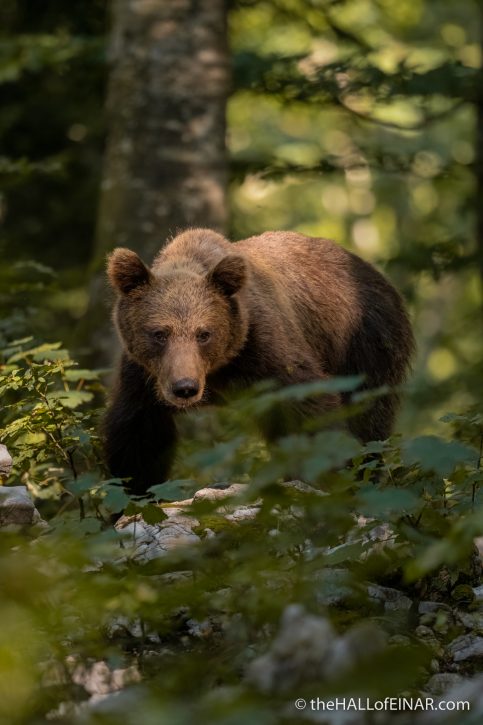…you’re sure of a big surprise
The instructions our Slovenian guide, Miha, gives us are impeccably clear. He speaks in Italian first, then checks our nationalities and speaks in English and German, too. His accent is admirable. He talks to the staff in Slovene.
We will be driven for half an hour into the forest where the wild Brown Bears live. We will be locked in small wooden hides for five hours. Under no circumstances are we to come out of the hides. It isn’t safe. We should take a bottle with us in case we need a wee. I’ve already borrowed some scissors and cut the neck off a large plastic bottle for the Puffin Whisperer. This is going to be fun.
Miha is at pains to give us photography instructions. All cameras must be in silent mode. We must take no photographs when we see the bears approaching; any sound or movement and they will leave, and we will not see them again. We must take no photographs until the bears have been eating for three or four minutes. There’ll be a small amount of corn and a few apples left scattered for them and it’s only when they feel safe, and are engrossed in eating, that we should take our first shots. There must be no ‘rapid-fire’ modes used, just single shots. If we are silent and careful, and wait, then we will have hours to take photographs of bears, if not, nothing. He also warns us not to take photographs of anything else while we wait. We’re not to take photographs of birds or other wildlife, no matter how exceptional. “Every day in the forest is exceptional”, he says. All this is in Italian, English and German. The instructions are a model of clarity and perfect in their execution.
There are seven of us in four hides, with three pairs and a single. We sit and wait, locked in, in the heat of a sultry day. We sit for an hour and there’s no sign.
Then, the most magical scene I have ever seen unfolds before our eyes. A mother Bear comes strolling slowly through the forest into a small clearing. She is massive. The light is beautiful, with dappled sunlight through the trees as her head sways as she walks. It’s then that we see, behind her, the most adorable cub, only a third of her length, trotting to keep up.
I hold my breath. I’d like to put the mirror of my camera up, so I can take silent shots, but I’m worried that even that will be too much noise, so I sit, holding my breath, willing them to settle and begin eating. There’s a strange noise off to my left. I see the mother bear do the most amazing thing; she rears up to her full height and looks around. It’s the single most impressive wild animal I have ever seen. To add to the spectacle, the bear cub does the same in a miniature imitation of its mother. It’s heart meltingly beautiful. I haven’t taken any photographs yet, I’m just appreciating the beauty of the scene and I’m obeying the strict instructions not to disturb them. I can’t wait for them to settle so I can get some shots.
Suddenly I realise that the noise I can hear is the loud shutter of the German man’s camera from the next hide, set on high speed, as he takes multiple shots a second. The bears run into the forest and are gone. We won’t see the pair of them again for the entire day.
How I curse him. What silent fury, what clenched teeth anger, what whispering of the phrase I check I’ve got right with the Puffin Whisperer, the English version of which is, ‘A curse on all of the souls of your favourite dead ancestors’. We were told: cameras on silent; don’t take photographs when they approach; don’t take photographs until they’ve been eating for three or four minutes; and take single shots not high-speed. He heard it in German, and yet he chose to get the shots he wanted and we got nothing. It’s so unfortunate that it conforms to all the national stereotypes.
I recognise that I come from a country which obeys rules, which forms queues and invented the nonsensical game of cricket. He works out how to turn his camera to silent mode for the rest of the afternoon. It won’t bring the mother and cub back.
I’ve got another four hours in this wooden cabin to stew and stew and stew. Bears do come along, and we do get photographs, but we’re still upset. I begin to hope that he doesn’t take notice of the instruction to stay in the hide either, and gets eaten by a bear, but apparently that was the one instruction he did hear.
Brown Bears are amazing creatures:
It’s to our eternal shame that we exterminated all the Brown Bears in the UK, probably 500 years ago but maybe even 1500 years ago. Later signs are probably imported individuals used for bear-baiting with dogs trained to be vicious. Even 100 years ago we were still importing Brown Bears for entertainment and using bear body parts, including bear grease as a quack cure for baldness. Britain isn’t a country of animal lovers. It’s a country of pet lovers and animal torturers, hunters and upper-class land-owning sadists.
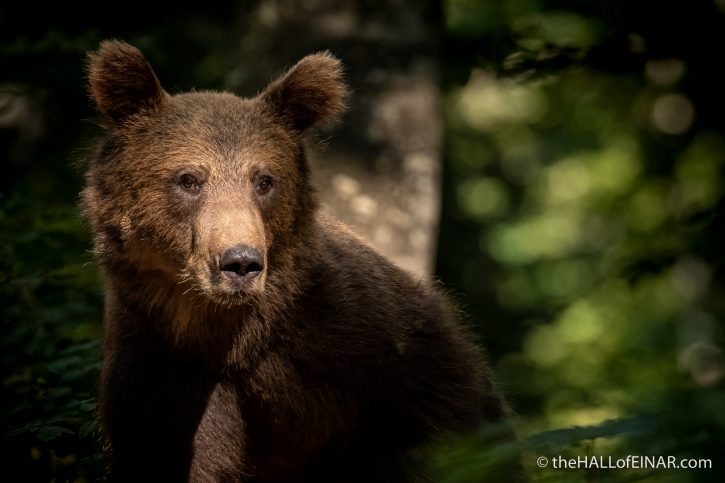
It’s vital that we bring Brown Bears back to one of their ancestral homelands.
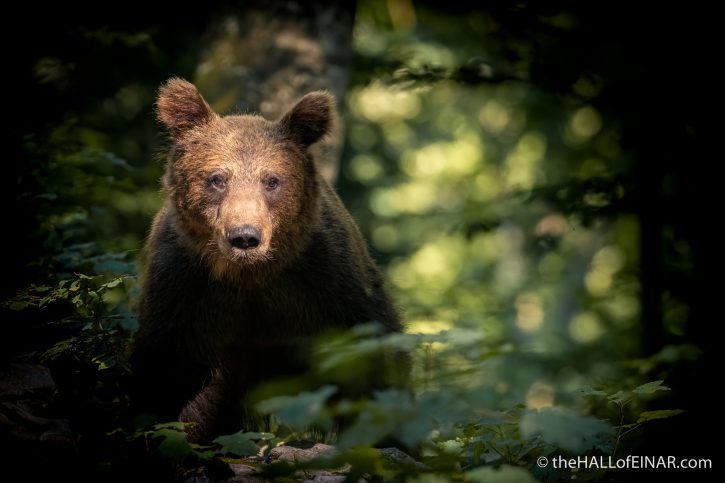
Brown Bears lived in Britain for 10,000 years. They lived peacefully, eating in the forests, having their cubs and hibernating in the winter.
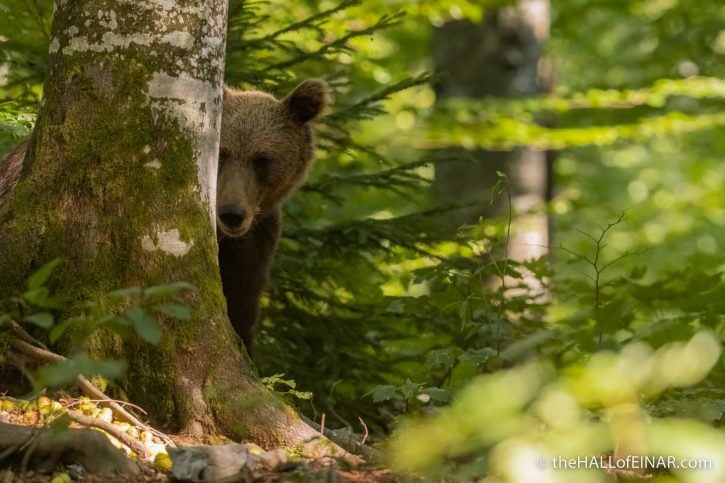
There’s no good reason why they shouldn’t be here again.
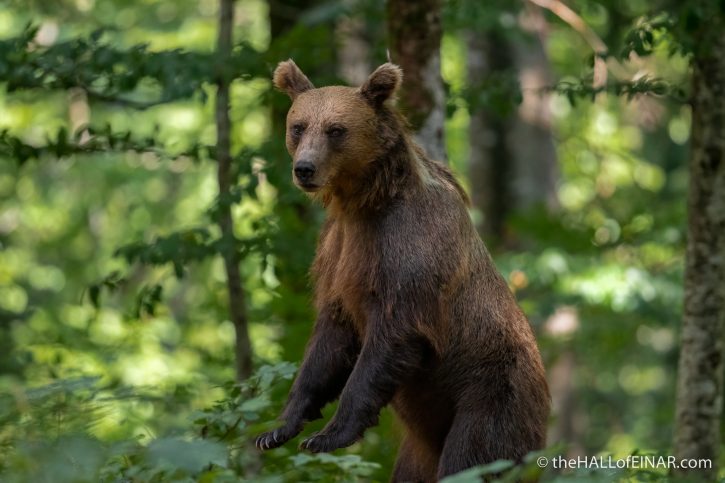
Perhaps my one over-riding impression of Brown Bears is the fact that there’s a living animal which looks like a teddy bear. A third of adults still sleep with a teddy bear in their bed. If only we could welcome real bears into our forests with the same open-hearted love.
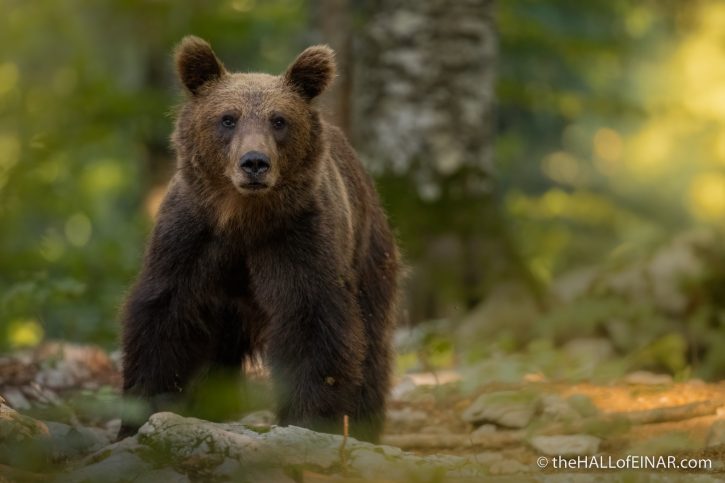
I fill the plastic wee bottle to the brim. It’s uncharitable, I know, but I imagine our German man wearing the contents of it.
At least there’s tomorrow, for more bear adventures.
